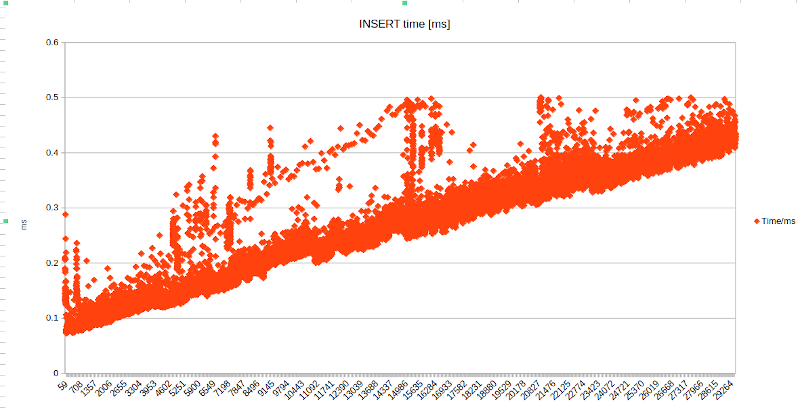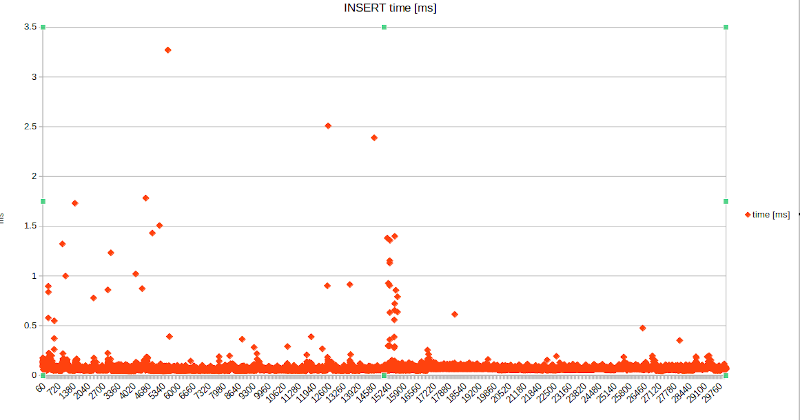Hi,
Probably my google-foo is weak today but I couldn't find any (convincing) explanation for this.
I'm running PostgreSQL 12.6 on 64-bit Linux (CentOS 7, PostgreSQL compiled from sources) and I'm trying to insert 30k rows into a simple table that has an "ON INSERT .. FOR EACH STATEMENT" trigger.
Table "public.parent_table"Column | Type | Collation | Nullable | Default -------------+------------------------+-----------+----------+-------------------------------------------- id | bigint | | not null | nextval('parent_table_id_seq'::regclass) name | character varying(64) | | not null | enabled | boolean | | not null | description | character varying(255) | | | deleted | boolean | | not null | false is_default | boolean | | not null | falseIndexes: "parent_pkey" PRIMARY KEY, btree (id) "uniq_name" UNIQUE, btree (name) WHERE deleted = falseReferenced by: TABLE "child" CONSTRAINT "child_fkey" FOREIGN KEY (parent_id) REFERENCES parent_table(id) ON DELETE CASCADETriggers: parent_changed BEFORE INSERT OR DELETE OR UPDATE OR TRUNCATE ON parent_table FOR EACH STATEMENT EXECUTE FUNCTION parent_table_changed();This is the trigger function
CREATE OR REPLACE FUNCTION parent_table_changed() RETURNS trigger LANGUAGE plpgsql AS $function$ BEGIN UPDATE data_sync SET last_parent_table_change=CURRENT_TIMESTAMP; RETURN NEW; END; $function$
I'm trying to insert 30k rows (inside a single transaction) into the parent table using the following SQL (note that I came across this issue while debugging an application-level performance problem and the SQL I'm using here is similar to what the application is generating):
BEGIN; -- ALTER TABLE public.parent_table DISABLE TRIGGER parent_changed; PREPARE my_insert (varchar(64), boolean, varchar(255), boolean, boolean) AS INSERT INTO public.parent_table (name,enabled,description,deleted,is_default) VALUES($1, $2, $3, $4, $5); EXECUTE my_insert ($$035001$$, true, $$null$$, false, false); EXECUTE my_insert ($$035002$$, true, $$null$$, false, false); ....29998 more lines
This is the execution time I get when running the script while the trigger is enabled:
~/tmp$ time psql -q -Upostgres -h dbhost -f inserts.sql test_dbreal 0m8,381s user 0m0,203s sys 0m0,287s
Running the same SQL script with trigger disabled shows a ~4x speed-up:
~/tmp$ time psql -q -Upostgres -h dbhost -f inserts.sql test_db real 0m2,284s user 0m0,171s sys 0m0,261s
Defining the trigger as "BEFORE INSERT" or "AFTER INSERT" made no difference.
I then got curious , put a "/timing" at the start of the SQL script, massaged the psql output a bit and plotted a chart of the statement execution times.
To my surprise, I see a linear increase of the per-INSERT execution times, roughly 4x as well:
While the execution time per INSERT remains constant when disabling the trigger before inserting the data:
What's causing this slow-down ?
Thanks,
Tobias
How much does the function-ed UPDATE statement take?
Regards,
Ninad Shah
On Sat, 17 Jul 2021 at 02:57, Tobias Gierke <tobias.gierke@xxxxxxxxxxxxxxxx> wrote:


